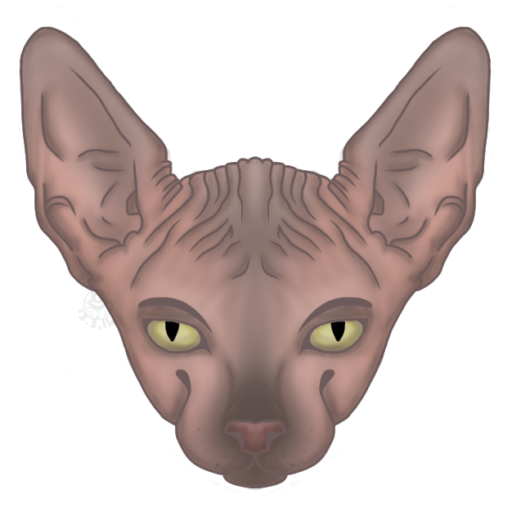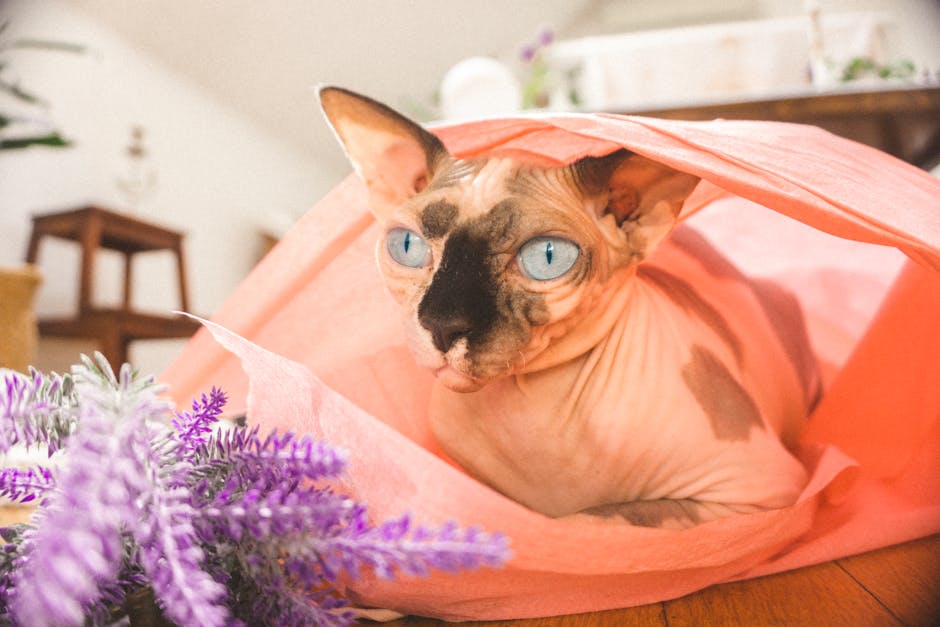Introduction to the Sphynx Cat Breed
Sphynx cats stand out in the pet world, and not just because they’re hairless. Originating from Canada in the 1960s, their unique look isn’t the only reason they’re special. These cats have a reputation for being friendly, energetic, and surprisingly cuddly, seeking warmth from their humans. Don’t let the lack of fur fool you; they’re known for their love of snuggles. While they’re often marketed as hypoallergenic because of their hairlessness, it’s important to note that people’s allergies are often triggered by dander (skin flakes) and saliva, not just fur. Sphynx cats still produce both, but their grooming needs and the way you interact with them can help minimize allergic reactions. Despite their exotic appearance, they’re pretty low-maintenance in terms of personality, thriving on attention and interaction. If you’re looking for a pet that’s a conversation starter but also a loving companion, the Sphynx cat might just be the perfect choice.
Understanding Hypoallergenic Pets
Let’s get straight to the point: there’s a common myth that hypoallergenic pets don’t cause allergies at all. That’s not entirely true. What “hypoallergenic” means is that these pets tend to cause fewer allergic reactions, not that they’re allergy-proof. Now, when we talk about hypoallergenic pets, especially cats like the Sphynx, it’s because they produce less of the main allergens that trigger symptoms in allergy sufferers. These allergens are often found in pet dander, saliva, and urine. The Sphynx cat, with its lack of fur, doesn’t trap and spread dander in the same way a furry cat does. This doesn’t mean they’re completely allergen-free—they still produce saliva and skin oils. The idea here is that without a thick coat to shed, there’ll be less of those allergens floating around your home. So, if you’re allergic but love pets, a Sphynx could be a good match. Just remember, hypoallergenic doesn’t mean no allergies. Always spend time with a Sphynx before adopting to see how your allergies react.
Reasons Sphynx Cats Can Be Good for Allergy Sufferers
Sphynx cats are often called hypoallergenic, which catches the eye of allergy sufferers. This doesn’t mean they’re completely allergy-free, but they have unique features that may reduce allergic reactions. Here’s why: For starters, these cats don’t have fur. Most people allergic to cats are actually reacting to proteins in the cat’s saliva that sticks to their fur. When cats groom, they spread this saliva-coated fur around. With Sphynx cats, there’s no fur to trap the saliva or dander, which are common allergens. So, fewer allergens get spread around the home. Also, shedding is minimal. While no cat is entirely non-shedding, Sphynx cats shed very little because they lack a significant amount of hair. Less hair means fewer allergens in the environment. However, they still produce dander and saliva. Regular bathing can help control these potential allergens, making Sphynx cats a considerable option for those with mild to moderate allergies. But remember, everyone’s allergies are different. It’s wise to spend time with a Sphynx cat before bringing one home to see how your allergies react.
How Sphynx Cat Breeders Ensure Hypoallergenic Qualities
Sphynx cat breeders play a crucial role in ensuring the hypoallergenic qualities of these unique pets. Unlike what many think, it’s not the fur itself causing allergies in most cases, but the proteins in cat saliva that stick to their fur. Sphynx cats, with their lack of coat, minimize the spread of these allergens.
Breeders focus on healthy breeding practices to maintain the Sphynx’s hypoallergenic traits. They select parents with fewer allergy-inducing proteins in their saliva, aiming for offspring less likely to trigger allergic reactions. Regular health checks are a must, ensuring the cats are not only hypoallergenic but also healthy and happy.
Moreover, breeders advise on proper care, including regular baths. Yes, Sphynx cats require baths to remove body oils and any potential saliva residue, further reducing the risk of allergies. Through responsible breeding and care, Sphynx cat breeders ensure these unique cats can be a great fit for families with allergies. Remember, no cat is 100% hypoallergenic, but with the right practices, Sphynx cats come close.
Caring for a Hypoallergenic Sphynx Cat
Thinking Sphynx cats are low-maintenance because they’re hairless? Think again. These unique pets need regular care to keep them healthy. First, their skin gets oily, meaning you’ll need to bathe them weekly. Use a gentle, cat-specific shampoo to avoid skin irritation. Next, their lack of fur means they get cold easily. Keep your home warm and consider cat clothes to help them stay cozy. Also, their ears gather more dirt since no hair blocks the entrance. Clean them weekly with a vet-recommended solution. Remember, caring for a Sphynx cat requires commitment, but their affectionate nature makes it worth it.
Common Misconceptions About Sphynx Cats and Allergies
Many think that since Sphynx cats don’t have fur, they don’t cause allergies. This isn’t quite right. The truth is, it’s not only cat fur that triggers allergies but also their saliva and skin cells. Sphynx cats still produce these allergens. So, even if they’re “hairless,” they can still cause allergic reactions. Another misconception is that Sphynx cats are entirely hypoallergenic. No cat is 100% hypoallergenic, including the Sphynx. However, for some people with mild allergies, Sphynx cats might trigger fewer symptoms compared to furry cats. It’s also worth noting that Sphynx cats require frequent baths to remove oils that their skin produces, which, on the bright side, can reduce allergen levels in your home.
Selecting a Sphynx Cat from Breeders: What to Know
When you’re thinking about getting a Sphynx cat, choosing the right breeder is crucial. Not all breeders are the same, and you want to make sure your new pet comes from a healthy, caring environment. Here’s what to look for: First, check the breeder’s reputation. A good breeder is open about their breeding practices and happy to share information about the cat’s health history. They should also be registered with a recognized cat association. It’s important to visit the breeder’s facility. This lets you see where your cat grew up and how they are treated. Healthy, socialized cats come from clean environments where they can play and interact with people and other cats. Ask about health screenings. Reputable breeders screen their cats for common health issues like heart problems and genetic diseases. These screenings help ensure you’re bringing home a healthy cat. Finally, a good breeder will ask you questions too. They want to know their cats are going to a good home. If a breeder seems more interested in making a quick sale than the cat’s welfare, walk away. Selecting a Sphynx from a breeder is about more than just finding a pet; it’s about finding a new family member from a place that cares as much about their well-being as you do.
Living With a Sphynx Cat: Real Owners’ Experiences
Many folks think that because Sphynx cats don’t have fur, they won’t stir up allergies. That’s partly true, but there’s more to the story. Real owners share that living with a Sphynx cat does cut down on the sniffles and sneezes, but remember, it’s not just the fur that causes allergies. Things like cat dander and saliva come into play too. However, Sphynx cats produce less of the protein that triggers allergies, making them a solid choice for allergy sufferers.
Owners highlight the importance of regular baths for their Sphynx cats, which helps keep the skin clean and reduces the spread of allergens around the house. Yes, these cats do require more grooming than your average feline, but that effort can pay off in fewer allergy symptoms.
Another interesting point from those who’ve lived with Sphynx cats is about their warmth. These cats are like little radiators, always seeking warmth. So, they become cuddly companions, often snuggling up to their humans. This trait makes them adorable pets, but it also means they’re usually closer to humans than other cats, which is something to consider if you have allergies.
In short, while a Sphynx cat might not be completely hypoallergenic, many owners with allergies find their symptoms are much more manageable. Plus, the unique bonding and less hair around the house definitely sweeten the deal.
Health and Wellness Tips for Hypoallergenic Sphynx Cats
Hypoallergenic Sphynx cats might sound like a dream for allergy sufferers, but remember, no cat is truly 100% hypoallergenic. Sphynx cats, however, produce fewer allergens than most other breeds, which is why they’re often considered a good choice for those with allergies. Keep your Sphynx cat healthy and your allergy reactions at a minimum with these simple tips. First, bathe your Sphynx regularly. Unlike furry cats, Sphynxes lack hair that absorbs oils from their skin, so they can get oily and need weekly baths. This not only keeps the cat clean but also helps reduce the spread of allergens. Use a gentle, cat-appropriate shampoo and make sure to rinse thoroughly. Second, clean your home frequently. Even though Sphynx cats produce fewer allergens, regular cleaning of your living spaces can further reduce allergy triggers. Pay special attention to areas where your cat spends most of its time. Third, consider investing in a good air purifier. It helps capture pet dander and other allergens in the air, providing a cleaner breathing environment for everyone in the home. Lastly, regular vet check-ups are crucial. A healthy Sphynx is less likely to cause allergies. Your vet can help manage any skin conditions your Sphynx might develop and offer advice on proper nutrition to keep your cat’s skin healthy. Remember, handling Sphynx cats with care and maintaining a clean environment are key steps to enjoying their companionship without the sneezes and sniffles.
Conclusion: Why Sphynx Cats Are Worth Considering for Allergy Sufferers
Sphynx cats are a great choice for anyone with allergies. They’re not completely allergy-free, but they do have a major upside. These cats produce fewer allergens than furry cats, which means they’re easier on your allergies. What makes these cats really stand out is their loving personality. They are incredibly affectionate and crave human attention, making them perfect companions. They’re also quite unique looking, which can be a cool conversation starter. Yes, they might need a bit more care, especially with their skin, but the bond you’ll form is worth it. Plus, you won’t be dealing with cat hair all over your house, a nice bonus for anyone with allergies or who just doesn’t like the mess. So, if you’re looking for a pet that’s easier on your allergies and offers lots of love, the Sphynx cat is definitely worth considering.


